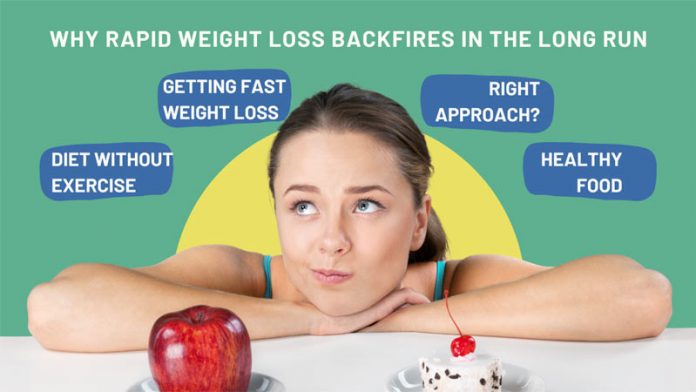Everyone loves to lose weight fast. Here, the operative word is ‘fast’. How ‘fast’ is healthy is always up for debate. It is universally accepted that losing 1 -2 pounds or about 0.5 to 1 kg weekly is safe. Losing more than this a week is normal when you start as you initially shed what is known as ‘water weight’. But over time, one should stabilize your weight loss to safe levels to prevent doing more damage than good with your diet.
The physiology of weight loss
Weight loss is influenced by multiple factors, of which diet and exercise are just two. Other lurking factors, like genetics and hormones, also play a vital role. In short, weight loss occurs when your body expends more energy than it consumes.
Excess energy is stored in the body in the form of fat. When insufficient energy is in the food intake, the body taps into its reserve for fat for energy. But to maintain the balance between intake and expenditure, other factors like hormones come into play which can affect functions like appetite and metabolism that impact weight loss.
Must Read: Why Starving Is Not Healthy And Effective Solution?
Different techniques used by people for weight loss
| Weight Loss Technique | Prevalence Among People (%) | Effectiveness (%) |
|---|---|---|
| Calorie Restriction | 80-90 | 5-10% |
| Exercise | 70-80 | 5-10% |
| Low-Carb Diet | 50-60 | 10-15% |
| Low-Fat Diet | 40-50 | 5-10% |
| Intermittent Fasting | 20-30 | 5-15% |
| Weight Loss Supplements | 10-20 | 2-5% |
Prevalence among people (%): Percentage of people who have tried this technique as per various surveys
Effectiveness (%): Average success rate based on research and clinical studies
Why Rapid weight loss is a bad idea
Rapid weight loss is often achieved through extreme dieting or extreme exercise. However, these routines are challenging to maintain over extended periods. Once you are lax in these rigorous routines, you will gain back weight.
When the body is in a calorie deficit after expending more energy than it takes in, it will break down muscle tissue and fat to meet its energy needs. This can lead to a decrease in energy levels and cause a reduction in metabolism. In addition, this loss of muscle tissue makes it even harder to lose weight in the long run.
Extreme dieting can lead to deficiencies of nutrients in the body, which increases the risk of health problems such as anemia, fatigue, and osteoporosis. It can also cause feelings of deprivation and an unhealthy preoccupation with food. This can lead to unhealthy eating patterns and cravings, resulting in bad food habits.
Rapid weight loss does not address the underlying behaviors or the physiology of weight loss. Instead, it is a knee-jerk action that could be more sustainable and show consistent results in the long run.
Must Read: How To Lose Weight Without Dieting?
Symptoms that reveal you are losing weight too fast
There are warning signs your body gives out when it is under stress. It is essential to listen to these signs while you modify your diet or lifestyle. Noticing these signs and understanding their warning is necessary to prevent severe damage to your body.
Watch for these warning signs while you try to lose weight fast.
- Fatigue: Rapid weight loss can lead to fatigue, as the body may not be getting enough calories to sustain normal energy levels.
- Weakness: Losing weight too quickly can also cause weakness, as the body may not be getting enough nutrients to support muscle strength.
- Dizziness: Low blood sugar levels, which can occur when the body is not getting enough calories, can cause dizziness.
- Headaches: Dehydration, which can be a side effect of rapid weight loss, can cause headaches.
- Constipation: Rapid weight loss can also lead to constipation, as the body may not be getting enough fiber.
- Hair loss: A deficiency in certain nutrients, such as protein, can cause hair loss.
Consult a professional before you embark on your weight loss journey
Each body is unique, and it is important to understand your medical condition before you make drastic changes to your diet and lifestyle. Healthcare professionals help you understand the limits to which your body can be pushed, and there is no ‘one rule fits all’ in these cases.
- Personalized advice: A healthcare professional will provide personalized advice based on your specific needs and goals while considering your body composition and metabolic factors. These are important as it varies for every individual.
- Safety: Losing weight too quickly can be dangerous and can cause a variety of health problems. A healthcare professional can help you determine a healthy rate of weight loss that is safe for you.
- Medical conditions: Certain medical conditions can make it difficult to lose weight or can be made worse by rapid weight loss. A healthcare professional can help you manage these conditions and ensure your weight loss plan is safe.
- Nutrient deficiencies: Rapid weight loss can lead to deficiencies in important nutrients such as protein, iron, and other minerals. A healthcare professional can help supplement these nutrients while losing weight.
- Support: Losing weight can be challenging, and it’s helpful to have the support of a healthcare professional. They can provide encouragement and guidance to help you stay on track.
Losing weight and keeping it off
A slow and steady approach is often the most successful in a weight loss plan. This means focusing on sustainable lifestyle changes, such as increasing physical activity and eating a balanced diet. It is also essential to find a weight loss plan that works for you and to be patient – weight loss takes time, and it is necessary to give your body the time it needs to adjust to these changes.
In conclusion, while rapid weight loss may seem attractive, it is essential to consider the long-term consequences. A slow and steady approach focusing on sustainable lifestyle changes is often the most successful way to lose weight and keep it off in the long run, and of course, take professional guidance.
You might want to check out Kolors weight loss programs, where you can lose weight under the guidance of professionals.









